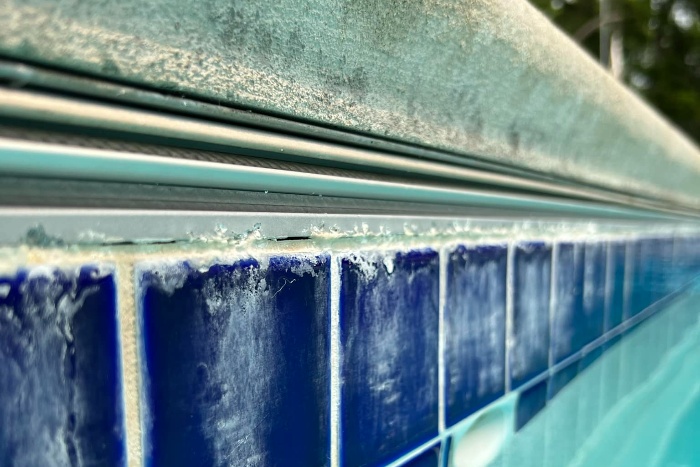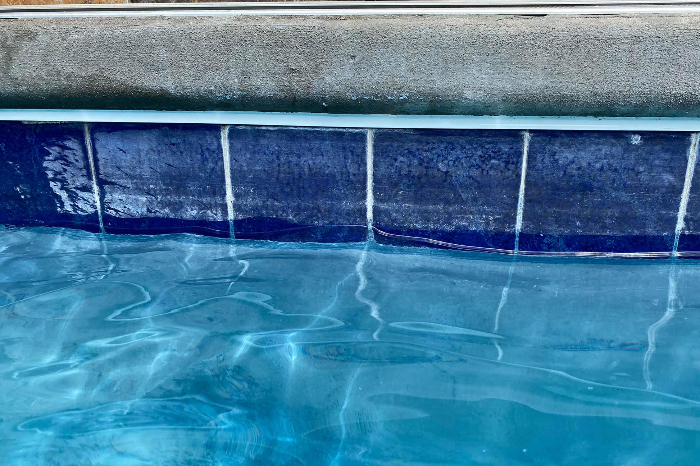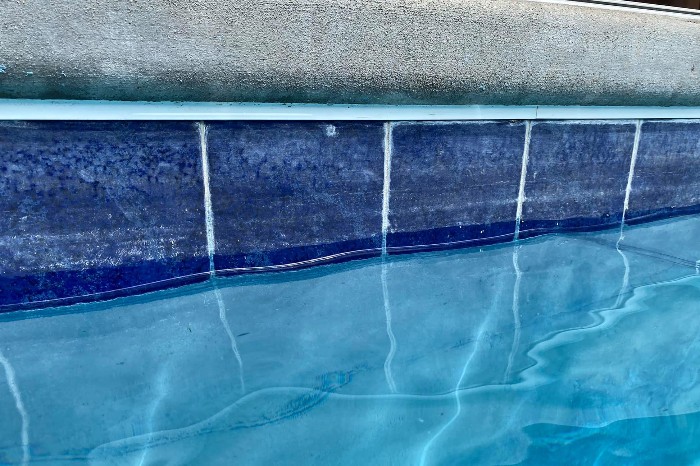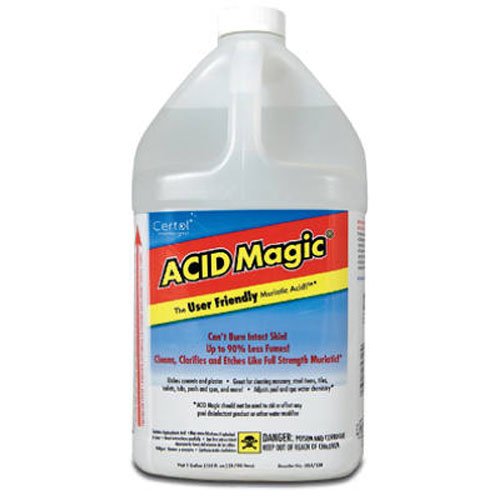Chemical imbalances that interact with a swimming pool’s surface can cause debris, stains, calcium, scale, and grime to collect on the tiles at the pool’s waterline. Let’s look at 5 ways to clean your pool’s tile.

Article Contents
What You Need To Clean Pool Tiles
You’ll need several tools and materials to clean your pool tiles. The material of the tile and the type of stain will determine what you’ll need. Here is a standard list of items for cleaning pool tiles, though you may not need them all. Read on for the specific tools you’ll need for specific stains.
Tools
- Pumice stone
- Pool vacuum
- Stiff bristled brush
- Soft-bristled brush
- Bucket
- Rubber gloves
- A sock (for the vitamin C or chlorine tablets)
Materials
- Baking soda
- Dishwashing liquid
- Sponge
- Commercial tile cleaner
- Vitamin C tablets
- Chlorine tablets
How To Clean Pool Tiles (In 5 Steps)
Step 1: Clean all Organic Matter From the Pool
You should start by cleaning the pool with a vacuum cleaner to remove all debris before you clean the tiles. This will prevent any staining agents like pollen, minerals, dirt, or something else from restaining your pool.
Step 2: Lower the Waterline
Although you can clean your pool’s tiles without draining, it’s easier to clean them if exposed. Lowering the water line will give you a clean surface to work on.
After you clean your tiles, make sure to raise the water back to the original level. Afterward, test your pool chemicals to make sure they are in balance.
Step 3: Use a Scrubbing Brush
The first step in cleaning your tile line is to scrub with either a stiff-bristled or soft-bristled brush to scrub away the mineral deposits. Use a soft-bristled brush on glass tiles, and do not use a metal brush for this process, as a metal brush will scratch or damage the tiles. The brush will loosen the mineral deposits, making cleaning the rest of the tile easier.
| Image | Product | Features | Link |
|---|---|---|---|
 | Rubbermaid Tile and Grout Brush
| 9.7 | Check Price |
 |
| 9.5 | Check Price |
 | US Pool Supply Hand-Held Brush
| 9.1 | Check Price |
Step 4: Remove Dirt and Grime
Now that the mineral deposits are loosened removing the softer detriment is time. There are two basic solutions you can use to clean regular dirt and grime.
- Baking soda and a couple of drops of water to make a paste
- ⅓ cup of Dawn dishwashing detergent to 1 gallon of water (Dawn is a great degreaser)
Once you have your preferred mixture, dip your scrub brush and scour the tile line. If there is staining, remove it with a sponge. After cleaning the tile, wash it with pool water to eliminate any smudges or streaks.
You can also use the following:
- 1 part of muriatic acid can be mixed with 4 parts water
- A commercial pool tile cleaner designed to remove scale
Step 5: Pumice Stone
If you still have mineral stains, it’s time to use a pumice stone. But don’t use it if you have glass tiles. For the stone to work, you must keep the tile and the stone wet at all times and be sure not to add too much pressure, or you could scratch the tile. Once you are done, wash away the streaks with pool water.
Tip:
If you have a large amount of buildup on your pool tiles, clean it in sections over a few days so the filter doesn’t get overwhelmed at once. This also helps maintain the pool’s chemical balance.
How Often to Clean Pool Tiles
You should clean your pool tiles twice yearly for regular maintenance, once when you open the pool for the season and when you close the pool for the winter.
Preventative maintenance is the best method for cleaning your pool tiles. Brushing the tiles and balancing your chemical levels weekly are the best way to prevent buildup on the tiles.
If the pool develops buildup or staining (it happens from time to time), start with the steps listed above. If the staining is more than everyday dirt and grime, like calcium or algae, it’s time for a more serious solution.
What Is the Buildup on Pool Tiles?
Improper pH or alkalinity levels cause buildup on pool tiles. Another common cause is algae, caused by the chlorine level being too low or other chemicals being out of balance. You may also get some buildup and scum from lotions and makeup.
Maintaining a chemically balanced pool will generally prevent any buildup from forming.
Cleaning Algae Off Pool Tiles
Algae are easy to identify, especially on pool tiles. It is green and slimy, like seaweed. When treating algae in your pool, chlorine is the best solution for cleaning algae off your tile line. First, wear gloves to protect your hands from harsh chemicals.
You always want to brush algae first to knock off the top layer so the chlorine can penetrate and treat the algae. You can spray the algae with Clorox or a diluted chlorine solution. However, if the algae are stubborn, place a chlorine tablet in a sock, dip it in water, and scrub the stain in a circular motion until the algae are gone.
Cleaning Metal Stains Off Pool Tiles
Metal stains have a dark, reddish-brown appearance. If you have metal stains on your tiles, place a vitamin C tablet in a sock, dip it in water, and scrub the stain in a circular motion until the staining is gone. You can get a vitamin C tablet here:
- Supports a healthy immune system
- No artificial colors, flavors, or chemical preservatives
- Vegan and gluten-free
Make sure to test your water for excessive metals and treat too. Whatever is staining your tiles contaminates your pool.
Cleaning Scale Off Pool Tiles
Scale appears as a gray, white, or brown patch caused by unbalanced pH levels. It’s more common in pools that use a saltwater chlorine generator.
To remove the scale from the pool tiles, mix a solution of half water and half white vinegar and apply it to the scale buildup with a scrub brush. When you’re done, wash the solution off with pool water.
You can also use a commercial tile cleaner.
Cleaning Calcium Carbonate Off Pool Tiles
Calcium carbonate is the most common type of calcium deposit found in pools and looks white and flaky. If you have a build-up on your tile line, scrub it with a wet pumice stone until it’s gone.
Cleaning Scum Off Pool Tiles
Scum lines are caused by a buildup of organic waste in your pool. The waste could be anything from suntan lotion, body oils, or dirt. Scum can be cleaned by several different household cleaners, like dish soap, baking soap, vinegar, and even toothpaste. Apply it with a wet cloth and scrub it until it is removed.
Cleaning Different Types of Pool Tiles

Cleaning Glass Pool Tiles
Glass tiles will scratch if you use a stiff-bristled brush or pumice stone on them. If you have staining, the best solution is to clean them with a water/vinegar mixture and apply it with a cloth or wet sponge.
Cleaning Ceramic Pool Tiles
Ceramic tiles are more scratch resistant than glass tiles and can be brushed. You can also use a pumice stone but don’t apply too much pressure and ensure the pumice stays wet throughout the process.
Cleaning Mosaic Pool Tiles
You clean mosaic tiles the same way you clean ceramic tiles. You can use a brush, cloth, or pumice stone. Commercial pool tile cleaners and household cleaners are safe to use on mosaic tiles.
Cleaning Porcelain Pool Tiles
You can use any brush, pumice stone, or cloth on porcelain tiles. Household and commercial cleaners are also safe to use on porcelain tiles.
What to Use to Clean Pool Tiles
Here are some different cleaners, tools, and homemade tile cleaners to use on pool tiles.
Muriatic Acid
- Same powerful cleaning properties as muriatic acid, but with added benefits
- Reduces the risk of corrosive damage to surfaces
- Effective alternative to traditional muriatic acid
1 part of muriatic acid can be mixed with 4 parts water and applied with a pool brush to pool tiles. This is an effective DIY pool tile cleaner.
- Effective cleaner
- Kills mold
- Harsh on skin
- Strong fumes
Commercial Pool Tile Cleaner
- Professional strength cleaner
- Recommended for use with the Protect-All Supreme
- Apply this product in small sections
Commercial tile cleaner is specifically designed for swimming pools and can clean various stains from scum, calcium buildup, and carbonates.
- Cleans multiple stains
- Cleans grout
- Safe for all tile types
- Expensive
Pumice Stone
- Removes lime, calcium, scale build-up
- Safe for most pool surfaces
- Non-toxic and chemical free
Pumice stones are ideal for cleaning tougher build-ups like scale or calcium deposits. They should only be used on hard tiles like ceramic, or else they scratch the surface.
- Great for harder deposits
- Inexpensive
- Wears out easy
- Slow, so it’s not recommended to clean all of the pool tiles at once; only spot cleaning
Pressure Washer
- Up to 1800 watts of power
- Has 4 quick-connect spray tips
- Cleans tar, grease, oil stains, rust, and other stubborn gunk and grime
Pressure washers are great for cleaning hard-to-reach areas and for stubborn stains or calcium buildup. You should start with a low-pressure level, about 2,000 PSI, and start far away from the tile, or you risk breaking the tile.
- Fast and efficient way of cleaning (ideal for cleaning the entire tile area)
- Cleans tile grout
- Can easily damage pool tiles
- Can only be used on concrete, aggregate, or plaster pools
Which is Better for Cleaning Pool Tiles: Muriatic Acid or Tile Cleaning Solution?
| Muriatic Acid | Tile Cleaner | |
| Effectiveness | Excellent | Excellent |
| Strength | Strong | Gentler |
| Alters Water pH | Can do if too much used | No |
| Cost | Cheap (DIY) | More Expensive |
Muriatic acid and tile cleaning solutions attack multiple stains and can be used on all pool tile types. So, which is the best one for you? Here is a comparison between the two cleaners.
As stated above, muriatic acid is harsh and protective clothing needs to be worn whenever you use it. If the wind blows just right, you’ll breathe in the fumes, which irritates the throat.
Using a lot of muriatic acid will lower your pool’s pH level and require a pH increaser. The positive is that muriatic acid is cheaper than most tile cleaners, and you probably have some on hand already.
Commercial tile cleaners are a little pricey, but they are safer than muriatic acid and don’t alter your pool’s chemical balance. The best way to apply tile cleaner is to spray it on the tile, let it sit for a few minutes, and wipe it clean.
How to Clean Pool Tile Grout
Tile grout provides a bond between tiles and leaves a cleanable surface. Grout also provides a nice aesthetic and can make the color of the tiles pop. Grout is porous and gets dirty like tiles. These small pores are great hiding places for dirt and algae.
You should clean your grout when you clean the tiles. The cleaning process is similar to cleaning tiles; you want to clean the pool first. There are 7 ways to clean grout:
- Scrub the grout with a brush
- Vinegar and warm water
- Baking soda and hydrogen peroxide
- Chlorine tablet
- Acid wash (muriatic acid and water)
- Commercial tile cleaner
- Pressure washer
Tips for Cleaning Pool Tiles Without Draining

Here are our top tips to help you clean pool tiles without the hassle of lowering the water level or draining your pool.
- Use a pressure washer attachment with a detergent tank.
The detergent will break down the dirt or scum and the pressure, making it easier to clean with a pressure washer.
- Use a brush or a pumice stone.
A brush or pumice stone will clean the tiles without reducing the water level or altering the chemical balance. - Using household cleaners to clean the tiles.
If you stick with using household cleaners, you won’t alter the chemical balance, which works well even when the tiles are wet.
FAQs
Can You Use Vinegar to Clean Pool Tiles?
Vinegar is a great cleaning solution for pool tiles and can be applied directly or can be diluted. I don’t recommend using apple cider vinegar because it could stain some tiles.
Can You Use Ordinary Kitchen Cleaners to Clean Pool Tiles?
Ordinary cleaners can be used to clean pool tiles. Baking soda, vinegar, dish soap, and detergents are safe on pool tiles.
Does My Pool Need to be Drained to Clean the Tiles?
Pools don’t need to be drained to clean the tiles. Using a brush or pumice stone is the easiest way to clean the tiles without draining them. It does, however, help to lower the water level a few inches so the stains at the waterline can be accessed.
What Causes Scale Buildup on My Pool Tiles?
High pH or alkalinity levels cause calcium carbonate to separate from the water and stick to the pool tile. To fix this, you’ll want to test the water and then adjust the pH and alkalinity to the correct levels. You could also test for excessive metals in your pool water – this is more common if you use well water to fill your pool.






